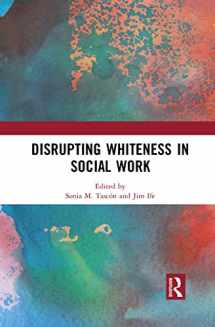
Disrupting Whiteness in Social Work
Book details
Summary
Description
Focussing on the epistemic – the way in which knowledge is understood,
constructed,
transmitted and used – this book shows the way social work
knowledge has been constructed from within a white western paradigm, and
the need for a critique of whiteness within social work at this epistemic level.
Social work, emerging from the western Enlightenment world, has privileged
white western knowledge in ways that have been, until recently, largely unexamined
within its professional discourse. This imposition of white western
ways of knowing has led to a corresponding marginalisation of other forms
of knowledge. Drawing on views from social workers from Asia, the Pacific
region, Africa, Australia and Latin America, this book also includes a glossary
of over 40 commonly used social work terms, which are listed with their epistemological
assumptions identified. Opening up a debate about the received
wisdom of much social work language as well as challenging the epistemological
assumptions behind conventional social work practice, this book will be
of interest to all scholars and students of social work as well as practitioners
seeking
to develop genuinely decolonised forms of practice.


We would LOVE it if you could help us and other readers by reviewing the book
Book review



